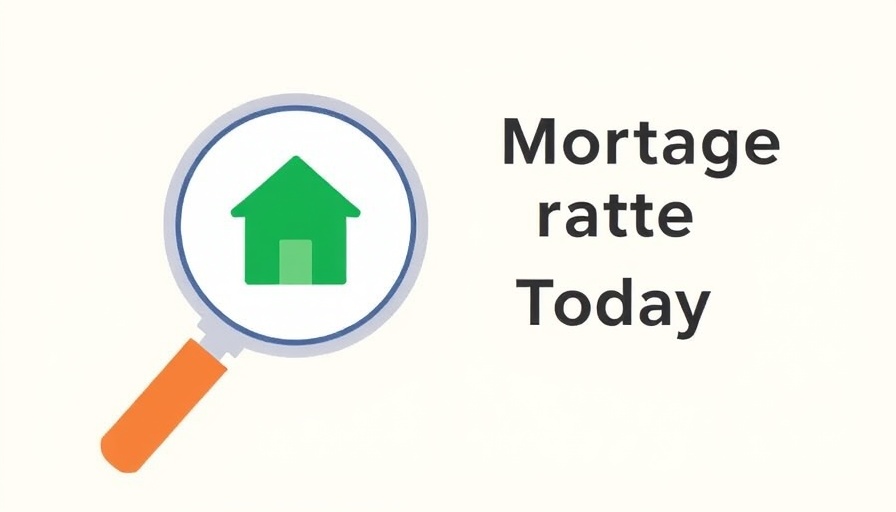
Understanding Your Cash Options in a Shaky Market
In today's unpredictable financial landscape, many small business owners and managers are seeking refuge for their cash as the stock market shows fluctuating trends. The growing concern over long-term investments can drive anyone to rethink their financial strategies. Thankfully, there are a variety of short-term, low-risk alternatives that can help protect your capital while potentially still earning interest.
High-Yield Savings Accounts: A Reliable Haven
High-yield savings accounts have gained significant traction as a safe alternative for storing cash. They offer better interest rates than traditional savings accounts, helping your funds grow without locking them away for extended periods. With the average high-yield savings account offering rates as high as 4% per year or more, this option allows businesses to keep their cash accessible while still benefiting from earning interest.
Moreover, most of these accounts are FDIC insured, meaning your deposits are protected up to $250,000. For business owners apprehensive about the stock market, this could be an ideal solution to maintain liquidity while earning a reasonable return.
Certificates of Deposit (CDs): Safety with Fixed Returns
Certificates of Deposit (CDs) are another attractive option for those looking to park cash momentarily. They involve locking funds for a specified period, ranging from a few months to several years, in exchange for a fixed interest rate. Depending on the term, rates can be competitive—sometimes exceeding 5%. This setup not only ensures predictable returns but also guarantees that your investment will not lose value during the commitment period.
Small business managers might consider CDs for short- to medium-term goals, allowing them to plan cash flows while aiming for higher yields compared to traditional savings accounts.
Treasury Bills: A Government-Backed Investment
Treasury bills (T-bills) represent another secure avenue for cash parking. These short-term government securities are sold at a discount and mature in a year or less. The face value is paid back in full at maturity, making T-bills a virtually risk-free option backed by the U.S. government.
For business managers wary of market volatility, T-bills offer a familiar, secure choice with a guaranteed return. They also provide flexible terms, allowing businesses to align their investments with cash flow needs.
Networking: Taking Advantage of Financial Literacy Resources
In addition to exploring various parking options for cash, small business owners can greatly benefit from financial literacy resources available in their networks. Engaging with fellow entrepreneurs or mentors provides diverse perspectives on finance management and investment strategies. This communal knowledge can open doors to novel ideas and approaches in uncertain markets.
Webinars, podcasts, and local financial workshops often provide invaluable insights into personal finance management, helping you to bolster your confidence in decision-making.
Future Trends: Where is the Market Heading?
The outlook for next year's economy remains uncertain, with evolving interest rate policies and inflation being at the forefront of discussions. Market analysts suggest that diversifying assets—split between cash vehicles like savings accounts, CDs, and T-bills, as well as strategic investments—could be crucial for businesses aiming to weather potential storms ahead.
Understanding how these trends may affect your business can set a foundation for smart decisions today. Keeping an eye on economic indicators and adjusting your investment strategies accordingly is essential for staying ahead.
Emotional Preparedness: Managing the Financial Stress
Financial uncertainty can induce significant stress, especially for business owners carrying the weight of their employees and stakeholders. Recognizing the emotional aspect of managing finances is important. Creating a thorough cash management plan, understanding your options, and having access to financial advice can help alleviate anxiety.
Connect with peers to share experiences, as many are navigating the same concerns. Tailoring strategies to your unique business context can help foster resilience in the face of uncertainty.
Conclusion: Take Control of Your Financial Future
As concerns about the stock market linger, prioritizing the parking of your cash wisely can safeguard your business's finances. Exploring high-yield savings accounts, certificates of deposit, and treasury bills offers various avenues for securing your capital. Don't shy away from leveraging your network for financial knowledge, and remain abreast of market developments to make informed decisions. Act now and refine your approach to managing cash reserves. Understanding your options empowers you to control your financial future effectively.
 Add Row
Add Row  Add
Add 




Write A Comment